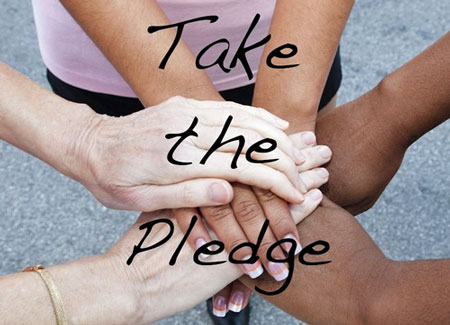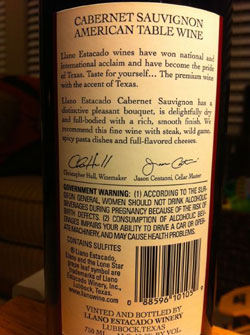The Texas Winemakers/Winery Owners Pledge (and Good for Other Local Wine States, Too)
Some of you have seen the blog and reader comments over the past few days on CraveDFW (click here) on “For-Sale-in-Texas-Only” wine. I made an attempt to re-frame the discussion on my subsequent blog (click here) away from what Whole Foods and the state-supported GoTexan Program were doing to what Texas wineries were doing and what (in my opinion) should do. My thoughts focused on the ramifications of their using of the phrase “For Sale in Texas Only” on wine bottle labels versus having the wineries clearly label the source of the grapes used in this wine using “Texas” appellation*, “American” appellation or any of the other approved appellations given by the Alcohol and Tobacco Tax and Trade Bureau at the U.S. Department of the Treasury – TTB (click here) that correctly describes the location of origin of the grapes in the wine.
The basis of my previous comments was that use of the confusing term “For Sale in Texas Only” – which some people actually have been told and others think means a special Texas product only for Texans). The situation is that such wines do not have enough Texas grapes in the wine to actually allow it to be a legal Texas wine according to the people that write the rules at TTB. In an effort to reduce or eliminate the use of “For Sale in Texas Only” on Texas wine bottle labels, I’ve developed a Texas Winemakers/Winery Owners Pledge as stated below:
Texas Winemakers/Winery Owners Pledge
I, (insert name & winery), pledge to the wine consumers of Texas that I will:
One: Where possible, based on price point, quality, and the competitive price in the marketplace, buy Texas grapes or use estate grown grapes, and where sufficient Texas grapes are included in the wine, label this wine as Texas wine using one of the Texas appellations approved by the TTB.
Two: If due to price or availability of Texas grapes, it is necessary to make and sell wine made from out-of-state grapes, this wine will be labeled as “American” appellation or other legally approved non-Texas appellations approved by TTB. I will not use the label exclusion for appellation authorized by TTB under the phrase “For Sale in Texas Only”.
Three: Support efforts to expand production of Texas wine grapes using varieties that can be sustainably and economically grown in Texas and, where possible, include these varieties in my wines.
Do you want to support this pledge?
If you are a Texas winemaker or winery owner and wish to support in this pledge, I will post your name and link to your winery from this site. Likewise, if you are a Texas wine consumer and wish to voice your support of this pledge for clearer wine labeling, please send a comment to this blog and I will post your name on this site, too.
Is this Pledge Ill-Timed? I say no, and I hope you do to
Some in the Texas wine industry may feel that, with the bad weather experienced this past spring (that is expected to cause a further shortage of Texas grapes from the 2013 harvest), this pledge is ill-timed. However, it is precisely why Texas needs to address this issue now. It is because of the unpredictable nature of this situation that we will likely see out-of-state grapes play a significant and important role in our state’s wine production for the near term.
This pledge is offered now to help Texas winemakers, winery owners and wine consumers bring out-of-state grapes from the darkness of “For Sale in Texas Only” and into the light of their proper sources as defined by their legal appellations. This is not too much to ask.
Frankly, if a Texas winery can make a really great wine from out-of-state grapes, with appellation correctly stated on the label, I would not hesitate to try it and encourage others to do the same. Many international wine brands now offer wines from multiple appellations both within their state and sometimes internationally, and label them accordingly. I’m not ashamed to say that I have purchased Cupcake Sauvignon Blanc (appellated New Zealand) and their Shiraz (appellated Australia) several times and they were good wines with good value for money spent. We should not be ashamed if a Texas winery could do the same.
We would all like to see high quality and quantity Texas grapes predominate our state’s wines. This will reliability be achieved only through the continued hard work of Texas winegrowers and over an extended period of time, and only with the support of Texas winemakers, winery owners and consumers. This is precisely how great appellations are created. Unfortunately, there are few short cuts in this process.
I believe that everyone’s “eye” needs to be on the “ball” and support Texas grape growing and working to increase the supply of Texas grapes that can be grown economically and sustainable here in Texas. Make no mistake: this is no small task.
Additional Note: It is not just a Texas issue…
This wine labeling issue is not restricted exclusively to Texas. Just about every state involved in producing local wine has experienced a rapid growth in wineries. As such, there is also a shortage of local grapes and wineries in those states, too, and their wineries have looked to out-of-state grapes for a portion of the wines they offer. Let’s work to get rid of “For Sale in (write in the name of your state) Only”, too. If you live in one of these wine-producing states and wish to borrow this pledge for your winemakers and winery owners, please feel free to do so.



Cindy and I support wineries making great wines and labeling them clearly and without deception as to the grape origin. It’s important that the consumer know that the wine is a Texas product or not. So, the pledge is a great step toward some accountability. And, when a winery uses foreign grapes and the wine is excellent, we will continue to praise and promote it.
I support Texas wines and will continue to support but I also want accountability. As a consumer I want the truth in where the grape comes from and how much is truly Texan.
Even after all these years, For Sale In Texas is still confusing to everybody so this should make things much clearer. A lot of wineries are starting to state where the grapes come from and that makes things very clear. Like was stated, it isn’t always possible to get Texas grapes so there should be no shame when unable to do so.
The returns are starting to come in. I will start to post those that support The Pledge tomorrow.k
I’m on board. We grow grapes and make wine, just like they do in California, France and innumerable other places. You will not see “For Sale In Texas Only” on an Alamosa Wine Cellars label. If I ever get grapes from Lodi, the label will say Lodi.
The pledge is excellent! No way around it; we need more grape vines planted in Texas.
It is not helpful for Texas wineries to buy grapes that do not grow well in Texas from other regions and then sell them to consumers in a way that makes them feel that they are buying wine made from Texas grapes. Some of the most successful wineries in our state make it their SOP to confuse this issue and it must stop for the good of our grape growers and the future of our wine industry.
First clue; we can not grow Pinot Noir or Chardonnay the way California and France do.
Steve, interesting comment and I agree that confusion has no place as a central point in a business model because it is destine to fail.
I also agree that there are some grape varieties that just aren’t going to make it here in Texas. If a Texas winery brings in a non-Texas PInot Noir and tries to fool me into thinking its Texas (under the FSITO label) that’s bad. However, if a Texas winery brings in high quality grapes from a Pinot-producing region and opening tells me what it is and where it is from, I’ll try it and enjoy the experience.
Let’s all rally behind truth in wine labeling from Texas wineries and exclusion of FSITO.
Russ
We take the pledge! At Grayson Hills Winery, we have always made our wine from Texas fruit per TTB regs and have never used the FSITO on our label. We will forever strive to use Texas fruit in the production of our wines. That is not to say that our skills will not someday be used to produce a wine from some other appellation but you can be assured it will be made by a Texan and labeled accordingly!
We support correct labeling and have been doing it since we opened.
Glad to see the pledge. It fits our philosophy “to a T.” We currently make 16 wines [one seasonally available]. Two made with the acai berry from Brazil, and 14 that are appropriately labeled from 100% Texas grown grapes. We will never use “For Sale in Texas Only” at Sunset Winery.
This movement is a great one which we should all support completely.
I rarely drop remarks, but after reading a bunch of remarks on The Texas Winemakers/Winery Owners Pledge (and Good for Other Local Wine States, Too) |
Vintage Texas Blog. I actually do have 2 questions for you if you don’t mind.
Could it be just me or does it give the impression like some of these comments appear as if they are written by brain dead visitors?
😛 And, if you are writing on other online social sites, I would like to follow anything new you have to post.
Could you list of the complete urls of your social
networking sites like your Facebook page,
twitter feed, or linkedin profile?
Clyde on Facebook see Texas Wine Drinkers Group at:
https://www.facebook.com/groups/TexasWineDrinkers/
On Twitter, follow hashtag #TXwine. See:
https://twitter.com/search?q=TXwine&src=typd
I take the pledge. Good job on this issue.